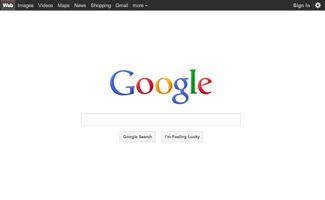Sign up to receive The Snapshot, a free special dispatch from Laptop Mag, in your inbox.
You are now subscribed
Your newsletter sign-up was successful
A man in his late 40s suddenly found himself unemployed during the 2008 financial crisis. The good news: His industry experience and resumé were both strong, and he was able to schedule multiple interviews over the next few months. Each interview went exceedingly well and each company seemed impressed with his track record. But time after time, no follow-up phone call came, and he was left jobless.
Frustrated, the continually rejected prospect turned to Google and realized that his hometown had recently digitized all of its public records. When he searched for his name, the top result was an arrest record from the ‘70s, when he was 18 years old. That was before he entered college, then grad school, and graduated at the top of his class. His interviewers had seen this arrest record, too.
If you’re not adding content to the Internet connected with your name, you’re allowing others to control your own personal search results. Whether it’s an embarrassing photo from your pre-professional life, or simply a case of mistaken identity where someone else has the same name, finding and reclaiming your online identity can be of vital importance.
With a little bit of work, you can find out what the Internet is saying about you and swing the pendulum back in your favor.
Where the Information Originates
There are two types of personal information that exist online. The first is social content created by individuals themselves, and the second is content created by third parties. Self-created content takes the form of social media websites such as Facebook, LinkedIn and Twitter, as well as personal blogs and photo albums. Most of these hubs have privacy controls, which allow the user to set certain information public or private, but most privacy experts recommend assuming that anything posted online may someday be seen by a potential employer.
Noah Lang, vice president of business development at Reputation.com, warned that going through and cleaning up your active social network personas might not be enough. “People often forget about legacy information that exists online,” he warned. “Myspace profiles still show up in search results, even if the user has forgotten the login information.”
Sign up to receive The Snapshot, a free special dispatch from Laptop Mag, in your inbox.
The second type of online personal information, from third parties, can be classified as “people data content.” This includes marketing data, public records and educational footprints. Entire businesses have sprung up that collect and sell this data to companies and individuals.
Websites such as Spokeo.com and BeenVerified.com allow anyone to search for a first and last name and view a wide range of information, often including home address, phone number and a list of known relatives. These listings, however, may get even more personal, displaying information such as a person’s religion. As more and more industries are becoming digitized, the amount of personal content available is growing significantly.
“A lot of the more rich information is from someone else’s publishings,” said Patrick Ambron, co-founder and CEO of BrandYourself.com. “Even if you don’t have an online profile, it doesn’t stop someone else from mentioning you. Facebook posts, blogs, articles: It all goes online now.”
Background Checking Yourself
With the amount of data gathered every day, it’s no surprise that Google is the best source of personal data and background check information. Entering search terms such as your full name, nicknames and email address returns the most readily available, and thus most seen, personal data.
Although search results for an individual name, depending on popularity, may result in the thousands, the first page of these search results is all that really matters. “Most people, around 94 percent, don’t leave the first page of Google,” Ambron said. Lang agreed: “People give a lot less credence [to results] on page 3 or 4, if they even go that far.”
Searching Google is a great way to see what information is available now, but doesn’t help with things that pop up days, weeks or months later. Ambron recommended setting up Google Alerts (google.com/alerts) for key terms related to your name. Once activated, Google will automatically send daily or weekly emails featuring new search results related to your specified parameters.
Your personal information may also be publicly available on numerous “background check” websites, such as Intelius.com, Spokeo.com, BeenVerified and WhitePages.com. Search for yourself in these directories, note if any personal information is displayed and check each site’s content removal policy. You may need to refine your search results by state to locate the correct result.
Who Might See It?
If you’re able to find unwanted information about yourself online, anyone with prying eyes can find the same content. That includes potential employers and company recruiters. Businesses are turning more and more to the Internet to find out about prospective employees.
“We’re seeing 80 percent of recruiters admit to looking at Google right off the bat,” said Lang, “with 23 percent continuing on to social networks.”
According to a hiring manager who asked to remain anonymous, Google and LinkedIn are often used to verify that a candidate’s information is consistent between the resumé and what he or she is claiming. “I don’t care what people do on their free time,” the hiring manager said, “but not implementing some very basic privacy controls…and compromising personal information [shows] carelessness.”
These days, personal information found online may be more important than resumés and cover letters. “Resumés are terrible,” the hiring manager continued. “What you find through Internet searches gives a much clearer picture of what a person’s career looks like over time.”
Beyond potential employers, there can also be negative consequences when private information is found by current co-workers and employers, or even nosy friends. If you have public information available online that you wouldn’t share with everyone you meet, your Internet reputation could use some cleaning up.
How to Take Control
It’s impossible to maintain constant control over your online identity, but there are ways to shake off the undesirable information. The first step is knowing what information is out there, and the best place to look is Google.
These search results fall into two main categories: content you control and items posted by a third party. Within these two groups, the sentiment can either be positive or negative.
“Once you know what’s out there, shift the control back to your favor,” Lang recommended. “The content should be owned and controlled by you. Even if the content is neutral, you want to shift the sentiment back to you.”
This can be done by creating content to bury unwanted search results. “You need a personal hub,” Ambron said, citing the Wordpress blogging platform, Tumblr or a BrandYourself.com profile. Websites like About.me and Flavors.me allow users to create a single-page website that links to authenticated social media profiles. “[This acts as a] central website that links to everything about you that you’re comfortable with people finding…[things that] you’d tell someone who you met at a party.”
Sign up for accounts at social media websites such as Facebook, LinkedIn, Tumblr and Twitter, even if you don’t plan on using the services. Use your real name and fill these sites with information you’re comfortable sharing. Large social media sites rank well on Google and will soon climb to the front page of your search results.
Both Lang and Ambron recommend purchasing your own .com domain, specifically yourname.com, if it’s available. “Get your own domain name…even if you don’t plan on using it,” urged Ambron, “so someone else doesn’t hijack it.” In addition, a domain name that includes your full name will rank high in Google search results.
Websites such as BrandYourself.com and Reputation.com specialize in online background checks and optimizing personal search results. These websites help build and promote, using established search engine optimization techniques and positive personal content that will help users take control of their search results.
Staying on Track
Online reputations are important for everyone, from the social media maven to those who haven’t even created a Facebook account. As more information becomes digitized, the risks from exposed private data increases.
The first step to seizing control of your online identity is to know what information exists and replace the negative and neutral sentiments with your own positive content. This can be done on your own, by signing up for social media websites, creating blogs or through assistance websites.
Allowing your online reputation to run amok can have negative consequences, both on future prospective opportunities as well as current situations. It’s important to be aware of your online presence and take steps to swing things into the positive.
“The fact of the matter is that people are going to look you up online,” Ambron said. “If you don’t take control of it yourself, someone else will take control for you.”




